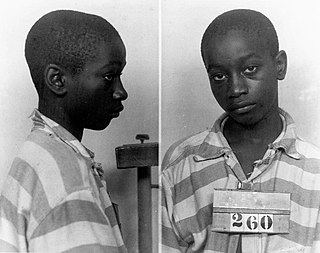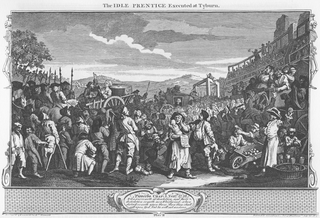
Execution by firing squad, in the past sometimes called fusillading, is a method of capital punishment, particularly common in the military and in times of war. Execution by shooting is a fairly old practice. Some reasons for its use are that firearms are usually readily available and a gunshot to a vital organ, such as brain or heart, usually kills relatively quickly.

Hanging is the suspension of a person by a noose or ligature around the neck. The Oxford English Dictionary states that hanging in this sense is "specifically to put to death by suspension by the neck", though it formerly also referred to crucifixion and death by impalement in which the body would remain "hanging". Hanging has been a common method of capital punishment since medieval times, and is the primary execution method in numerous countries and regions. The first known account of execution by hanging was in Homer's Odyssey. In this specialised meaning of the common word hang, the past and past participle is hanged instead of hung.

Capital punishment is a legal penalty in the United States, currently used by 29 states, the federal government, and the military. Its existence can be traced to the beginning of the American colonies. The United States is the only developed Western nation that applies the death penalty regularly. It is one of 54 countries worldwide applying it, and was the first to develop lethal injection as a method of execution, which has since been adopted by five other countries. The Philippines has since abolished executions, and Guatemala has done so for civil offenses, leaving the United States as one of four countries to still use this method.
Capital punishment in Canada dates back to Canada's earliest history, including its period as a French colony and, after 1763, its time as a British colony. From 1867 to the elimination of the death penalty for murder on July 14, 1976, 1,481 people had been sentenced to death, and 710 had been executed. Of those executed, 697 were men and 13 were women. The only method used in Canada for capital punishment of civilians after the end of the French regime was hanging. The last execution in Canada was the double hanging of Arthur Lucas and Ronald Turpin on December 11, 1962, at Toronto's Don Jail.

A nationwide judicial system in Iran was first implemented and established by Abdolhossein Teymourtash under Reza Shah, with further changes during the second Pahlavi era.

Landsberg Prison is a penal facility located in the town of Landsberg am Lech in the southwest of the German state of Bavaria, about 65 kilometres (40 mi) west-southwest of Munich and 35 kilometres (22 mi) south of Augsburg. It is best known as the prison where Adolf Hitler was held in 1924, after the failed Beer Hall Putsch in Munich, and where he dictated his memoirs Mein Kampf to Rudolf Hess.
Capital punishment is a legal penalty in the state of Texas, part of the United States.
Capital punishment is a legal penalty in Singapore. The first Prime Minister, Lee Kwan Yew, was a staunch supporter of harsh punishments including execution, but executions peaked under his successor, Goh Chok Tong; the city-state had the second highest per-capita execution rate in the world between 1994 and 1998, estimated by the United Nations to be 13.83 executions annually per one million people during that period. The highest was Turkmenistan with 14.92. Since then, execution has become far less common, with some years having no executions at all. No one was executed in 2012 and 2013, and two persons were executed in 2014. Nevertheless, in recent years, executions have started to increase again: in 2018, 13 people were executed, the most since at least 2003.
A false confession is an admission of guilt for a crime for which the confessor is not responsible. False confessions can be induced through coercion or by the mental disorder or incompetency of the accused. Research has demonstrated that false confessions occur on a regular basis in case law. Juveniles have a significantly higher rate of false confessions than do adults.
The 1988 executions of Iranian political prisoners was a series of state-sponsored execution of political prisoners across Iran, starting on 19 July 1988 and lasting for approximately five months. The majority of those killed were supporters of the People's Mujahedin of Iran, although supporters of other leftist factions, including the Fedaian and the Tudeh Party of Iran, were executed as well. According to Amnesty International, "thousands of political dissidents were systematically subjected to enforced disappearance in Iranian detention facilities across the country and extrajudicially executed pursuant to an order issued by the Supreme Leader of Iran and implemented across prisons in the country. Many of those killed during this time were subjected to torture and other cruel, inhuman and degrading treatment or punishment in the process."
Wrongful execution is a miscarriage of justice occurring when an innocent person is put to death by capital punishment. Cases of wrongful execution are cited as an argument by opponents of capital punishment, while proponents suggest that the argument of innocence concerns the credibility of the justice system as a whole and does not solely undermine the use of death penalty.
Capital punishment is a legal penalty in Iran. Crimes punishable by death include murder; rape; child molestation; sodomy; drug trafficking; armed robbery; kidnapping; terrorism; burglary; pedophilia; homosexuality; incestuous relations; fornication; prohibited sexual relations; sexual misconduct; prostitution; plotting to overthrow the Islamic regime; political dissidence; sabotage; arson; rebellion; apostasy; adultery; blasphemy; extortion; counterfeiting; smuggling; speculating; disrupting production; recidivist consumption of alcohol; producing or preparing food, drink, cosmetics, or sanitary items that lead to death when consumed or used; producing and publishing pornography; using pornographic materials to solicit sex; recidivist false accusation of capital sexual offenses causing execution of an innocent person; recidivist theft; certain military offenses ; "waging war against God"; "spreading corruption on Earth"; espionage; and treason. Iran carried out at least 977 executions in 2015, at least 567 executions in 2016, and at least 507 executions in 2017.
The execution van, also called a mobile execution unit, was developed by the government of the People's Republic of China (PRC) and was first used in 1997. The prisoner is strapped to a stretcher and executed inside the van. The van allows death sentences to be carried out without moving the prisoner to an execution ground. The vans also require less manpower per execution, requiring four persons to assist with the injection and are mobile. The PRC states that the vans are more humane than previous forms of execution. Human-rights groups predict that the execution rate in China will increase because of mobile capital punishment.

George Junius Stinney, Jr., was an African American youth convicted, at age 14, of murdering two white girls, ages 7 and 11, in his hometown of Alcolu, South Carolina. He was executed by electric chair in June of that year.
Capital punishment is a legal penalty in Saudi Arabia. The country performed at least 158 executions in 2015, at least 154 in 2016, at least 146 in 2017, and at least 149 in 2018.
Earl Wesley Berry was a convicted kidnapper and murderer from the United States. He was on Mississippi's death row with 64 others but was issued a stay of execution in October 2007 by the U.S. Supreme Court. He was ultimately executed on May 21, 2008.
Capital punishment is a legal penalty in the U.S. state of Colorado.
Capital punishment is a legal penalty in Indonesia. Although the death penalty is enforced only sometimes in grave cases of premeditated murder, it is regularly applied to some drug traffickers, drug dealers, and people in possession of modest quantities of illegal drugs.

The Ordinary of Newgate's Account was a sister publication of the Old Bailey's Proceedings, regularly published from 1676 to 1772 and containing biographies and last dying speeches of the prisoners executed at Tyburn during that period. The Accounts were written by the chaplain of Newgate Prison, recounting the statements made by the condemned during confession. Over 400 editions were published, containing biographies of some 2,500 executed criminals.







